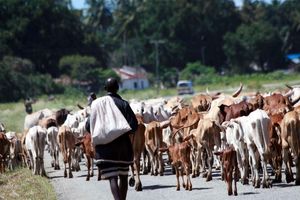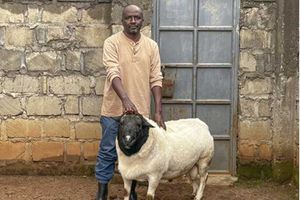
A farmer prepares fodder for his livestock at his home in Lwanda village, Lukuiyani. FILE PHOTO | NMG
African experts say the continent should focus on animal feed production as a long-term tool to fill a gap in agriculture, just as it could generate jobs for teeming masses of youth.
The proposals emerged from a recent conference in Lagos, where experts from the African Union, member states, and independent research institutions gathered to discuss the African food and poverty problem.
They reviewed glaring figures: Four in every ten people in sub-Saharan Africa rely on livestock for a livelihood, through the sale of meat, milk, hides, and skin or as fodder sales.
They also said that while Africa exported some $3 billion worth of livestock produce, it also imported some $10 billion. Some of this money went to the importation of animal feed and medicine, reflecting the gaps in there.
But one other unrelated issue was the rising unemployment, where nearly every country has a quarter or more of its educated youth population tarmacking.
Experts in the sector argue that the current financial models do not favour the livestock and feed and fodder sector when livestock farmers seek financing.
“It is time the livestock sector develops its bank, run by experts in the sector because they understand the pain points and how to de-risk it so farmers can access the financing for their operations,” said Dr Sarah Ashanaut Ossiya, the Animal Production Expert at AU-IBAR, the African Union Inter-African Bureau for Animal Resources (AU-IBAR).
“We have seen countries like China come up with construction sector-driven banks. The Livestock sector too can come up with its financial institutions to support the sector, in the wake of many challenges like climate change, offtake programs and so many more,” she said in December on the sidelines of the Lagos conference.
In Abuja, the experts were drawn from livestock productions, commodities exchanges, and authorities charged with regulating the sector. They convened in what they called deal rooms in Abuja and Lagos and raised some $225 million in funding to support livestock feed and fodder across Africa.
The funding was mainly raised through Nigeria’s Lagos Commodities and Futures Exchange (LCFF), The African Union Inter-African Bureau for Animal Resources (AU-IBAR), Nigeria Feed and Fodder Multi-Stakeholder Platform (NFFMSP), and Commodities Development Initiative (CDI).
Deal rooms are metaphorical conventions for raising money and creating operational structures to monitor the use of the money.
Experts say channeling funds towards the production of feed, fodder, and livestock development generally is crucial for creating employment, enhancing food security, and generating foreign exchange through export. They also said this kind of concert can help address challenges of inadequate investment, high cost of financing, and limited market structuring within the sector.
Often, they said, lending institutions have shied away from agriculture in general due to the perception the sector is too risky, and exposed to losses from climate change and political instability.
“We also want to structure funding propositions to attract capital market investments. It’s time to mainstream the livestock feed and fodder sector to be able to raise financing from the capital markets and these can be done when there are systems as such,” said David Maina, AU-IBAR Feed and Fodder Sector expert.
The Nigeria deal room also called on other private sector investors, development partners, and relevant stakeholders to align resources and expertise to the objectives of this partnership and actively participate in the subsequent Investment and market development activities targeting Feed and Fodder.
The funding also seeks to promote climate-resilient agricultural practices in Africa.









